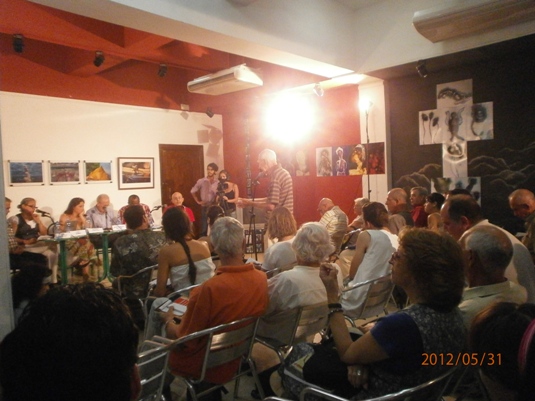I’m too lazy to get out! But I do not regret having gone to the meeting yesterday of the last Thursday of each month at the journal Temas (Topics). The theme was the self-employment. A large audience, including 24 Communications students from a university in southern California.
I expanded my horizons as a housewife. I learned that artists and religious priests are also “self-employed” workers, and that this category will soon become 20% of the workforce. I also found a display on 600 employed persons, which showed that they earn on average six times more than in their former state job (is the concept of “exploitation of man by man” falling into disuse?).
There were those who came to the defense of the reviled carretilleros, walking vendors with their carts, who have received a ton of abuse, as if they were responsible for the lack of variety and the high price of vegetables.
Although the panel members still used archaic language (especially the one “self-employed” panel), they generally spoke of the positive impact of this emerging sector in the recovery of the value of working and the need to change social attitudes that see this work as reprehensible — a form of mild forgetfulness that it is a natural reaction to a half century of government stigma associated with private and personal enrichment.
The best part came with the comments. There was a call for a clear regulatory framework and public statistics about this new line of work; there was talk of cooperatives in transport, (the oldest will remember the COA).
The writer Yoss posed a theoretical problem: If all economic power generates political power, is the state resigned to the possibility of losing their power? Then they addressed a legal issue Would it be better to prohibit early what you can NOT do, rather than approve what you can.
The self-employed comrade on the panel made clear that, contrary to what we were taught in the manual of political economy, economic changes will not bring political change, and the party will remain solely and exclusively in charge. The panel moderator joked about science fiction, Yoss’s favorite genre, but he also must remember, like almost all who have studied in Cuba, the topic of changes, an exam question.
Someone suggested a revision in the 1960 phone book regarding the classifications of national products, which are now imported due to the suppression of private labor. He urged scholars to define what are the basic means of production, which by law must be in state hands.
The young people, as always, shone a bright light. One talked about eliminating the fear of the reality of the changes, another asked if it they import and export, if State services such as SEPSA (security) can be used, if credit cards work. Another said that the union’s role is to defend the worker, not tell the bad news through a press organ of the Party. Another young professor explained his experience being self-employed and advocated that the measures to be regularized before implementation and not vice versa.
I left there in a better mood. We are neither brutish nor dull. What we lack is freedom.
June 1 2012

